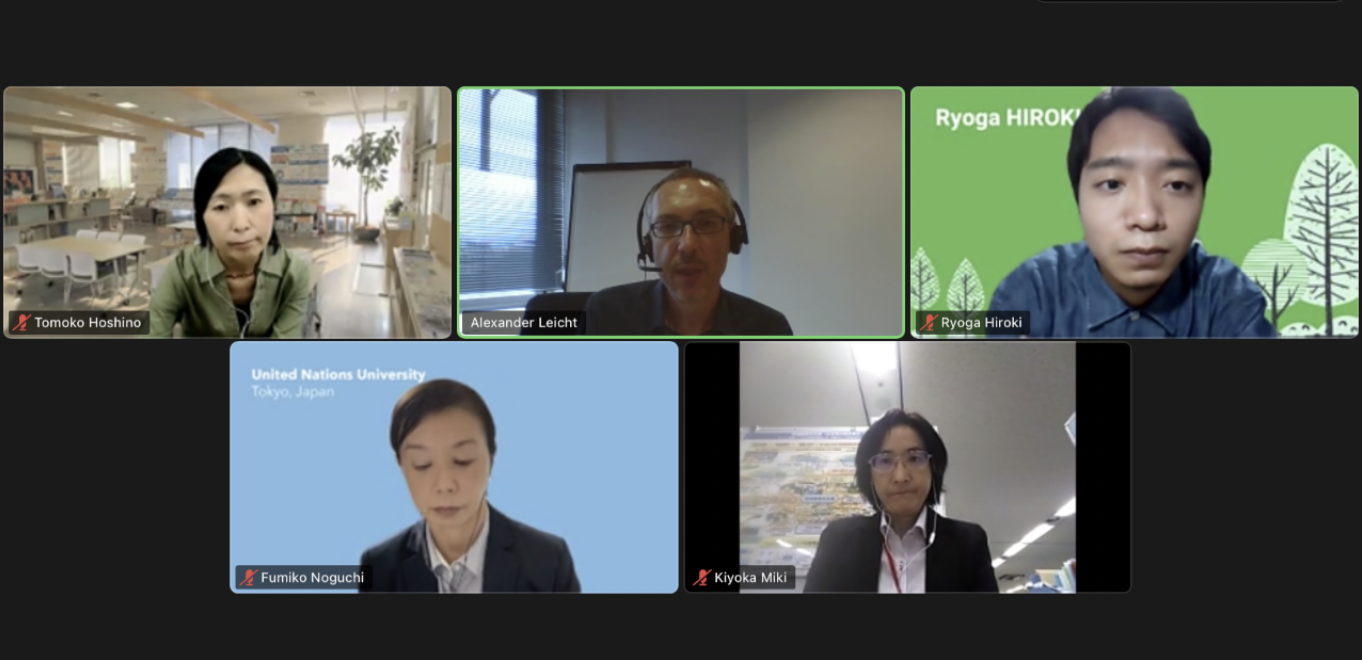Global, National and Community Actions for ESD for 2030 Discussed at UNU-IAS & MOEJ Event
 On 1 July, 2021, UNU-IAS and the Ministry of the Environment of Japan (MOEJ) co-organised a Global Environment Outreach Centre (GEOC) outreach event on the theme 'Synergising ESD for 2030 Stakeholders Dialogue - Learn for our Planet, Act for Sustainability' as part of a series of UNU-IAS events organised around the UN High-Level Political Forum on Sustainable Development (HLPF) 2021. The event was attended by more than 100 participants.
On 1 July, 2021, UNU-IAS and the Ministry of the Environment of Japan (MOEJ) co-organised a Global Environment Outreach Centre (GEOC) outreach event on the theme 'Synergising ESD for 2030 Stakeholders Dialogue - Learn for our Planet, Act for Sustainability' as part of a series of UNU-IAS events organised around the UN High-Level Political Forum on Sustainable Development (HLPF) 2021. The event was attended by more than 100 participants.
At the event, experts reported the key points addressed at the UNESCO World Conference on ESD (held in May 2021), and discussed ways to accelerate actions on ESD for 2030, through global all the way to the community with various stakeholders including youth, academia, policymakers and citizens. The role of academia and the importance of RCEs were highlighted in contributing to evidence-based policymaking and bridging the local community and academia together.
In the opening remarks, Prof. Shinobu Yume Yamaguchi (UNU-IAS Director) emphasised the importance of ESD for addressing issues exacerbated by COVID-19 and for a social transformation towards sustainable development. UNU-IAS's contribution to the UNESCO World Conference on ESD was also highlighted, including a booth and live session introducing RCE's climate actions and sessions on ESD within the local community and in higher education.
Mr. Tetsuya Nagashima (Director, Policy and Coordination Division, Minister's Secretariat of MOEJ) addressed the increasing importance of ESD as an integral element to achieve Japan's roadmap for realising carbon neutrality at the community level in harmony with the three elements: economy, society, and environment.
Dr. Alexander Leicht (Chief of Section, Section of Education for Sustainable Development, UNESCO) shared the ESD for 2030 framework and the outcomes of the UNESCO World Conference on ESD which was held between 17-19 May, 2021. He emphasised the importance of ESD for 2030 as the key instrument for making progress towards the 17 SDGs. Additionally, he highlighted the importance of the country-level commitments and initiatives that would bring together diverse stakeholders and synergies.
During the Q&A session moderated by Dr. Jonghwi Park (Academic Programme Officer, UNU-IAS), he addressed the important need for cooperation for data-based research for Target 4.7 of the SDGs. Moreover, he addressed the importance of the synergy of the five priority action areas, particularly establishing youth representatives and networks to involve youth in policy.
Regarding Japan's policy on ESD, Ms. Taka Horio (Assistant Secretary-General, Japanese National Commission for UNESCO, Ministry of Education, Culture, Sports, Science and Technology (MEXT)) reported about the contribution of the Japanese government to the UNESCO World Conference on ESD and introduced the 2nd National Action Plan on ESD and the revised ESD's guideline for educators. In addition, she shared some good practices of UNESCO Associated Schools addressing various issues such as marine plastics, aged communities, and disaster risk reduction. She also reported about the change of teachers' awareness involved in ESD activities from a feeling of burden to confidence in improving their schools. This was followed by Ms. Kiyoka Miki (Director, Environmental Partnership Office and Director, Office of Environmental Education, General Policy Division, MOEJ) who explained that ESD is integrated into various national policies and frameworks, such as the SDGs Implementation Guiding Principles and the roadmap for regional decarbonisation. She also introduced some concrete measures, including a training programme for nurturing environmental education leaders, enhancing ESD promotion networks at national and regional levels, and cooperation in promoting RCEs facilitated by UNU.
Ryoga Hiroki from RCE Yokohama Youth Association introduced activities voluntarily conducted by university students, included the coordination of a campaign promoting ethical consumption in collaboration with the private sector, and cooperating with the local government to organise multiple events on the environment and SDGs targeting various stakeholders, including citizens. In addition, together with other stakeholders, they established a platform for mutual support, regularly organise YouTube and Facebook Live events, and write news about topics on Yokohama to keep citizens informed. Finding potential issues which may not be visible was highlighted as important to realising a sustainable society, along with a sense of care for the community as key for spurring action.
In the panel session, panelists discussed key takeaway messages from the UNESCO World Conference on ESD, keys to accelerate ESD at the community level, youth actions, and the role of academia in ESD along with the Q&A with the participants.
Dr Leicht pointed out the significance of the UNESCO World Conference on ESD was the political commitment at the global and national levels. Ms Miki stressed the importance of addressing both international and local perspectives in promoting ESD, while Mr Hiroki highlighted the importance of presenting the unique viewpoint of youth in promoting ESD. Dr Noguchi pointed out that the role of academia in regards to ESD is to aggregate the local data together with the local stakeholders to contribute to evidence-based policymaking. She also highlighted that such cases are already observed within the RCE members.
In closing, Dr Akio Takemoto (UNU-IAS Programme Head) stressed ESD for 2030's role as a framework facilitating actions towards achieving the SDGs, and the importance of multi-stakeholder partnerships and collaboration for societal transformation.


